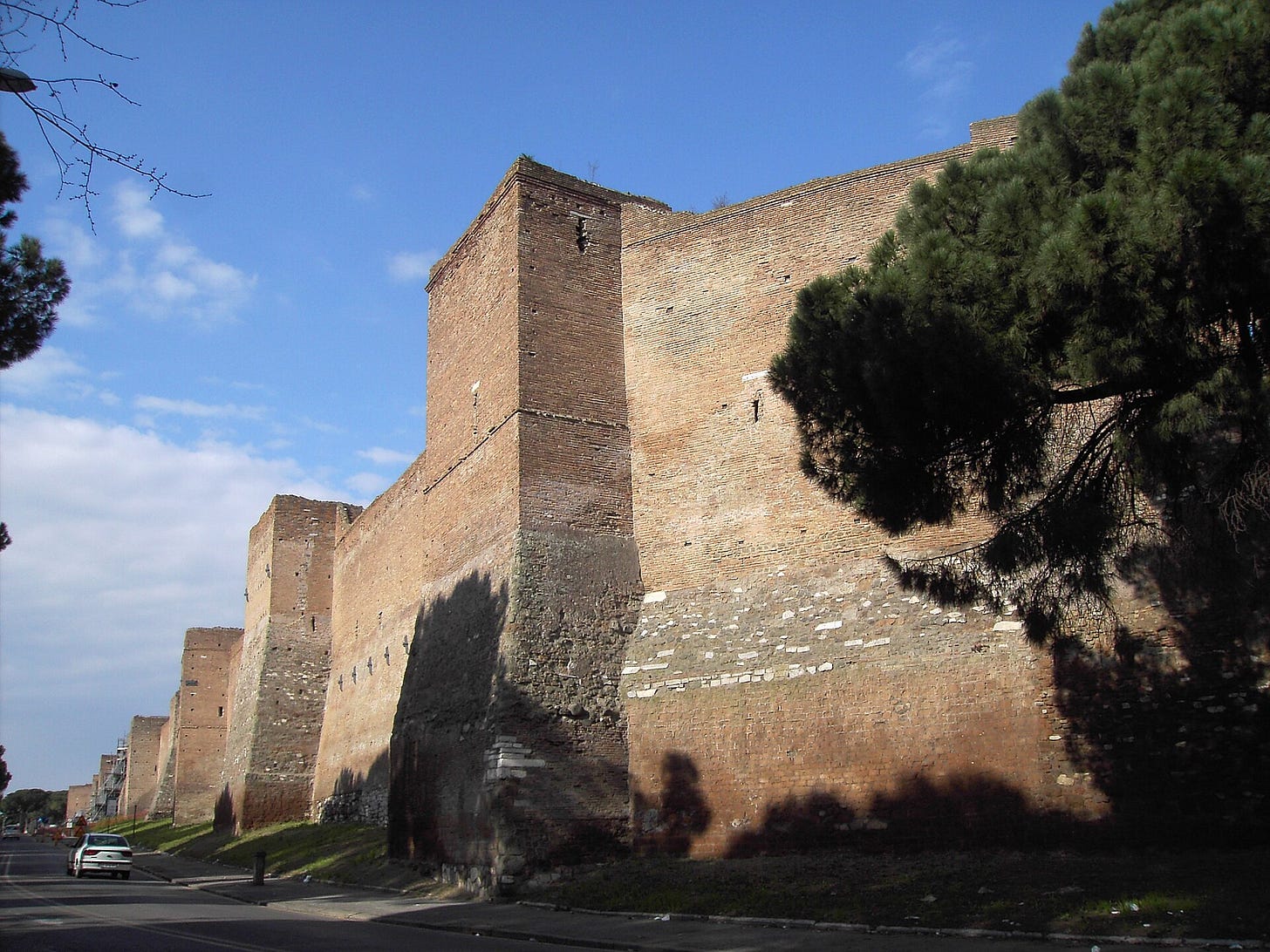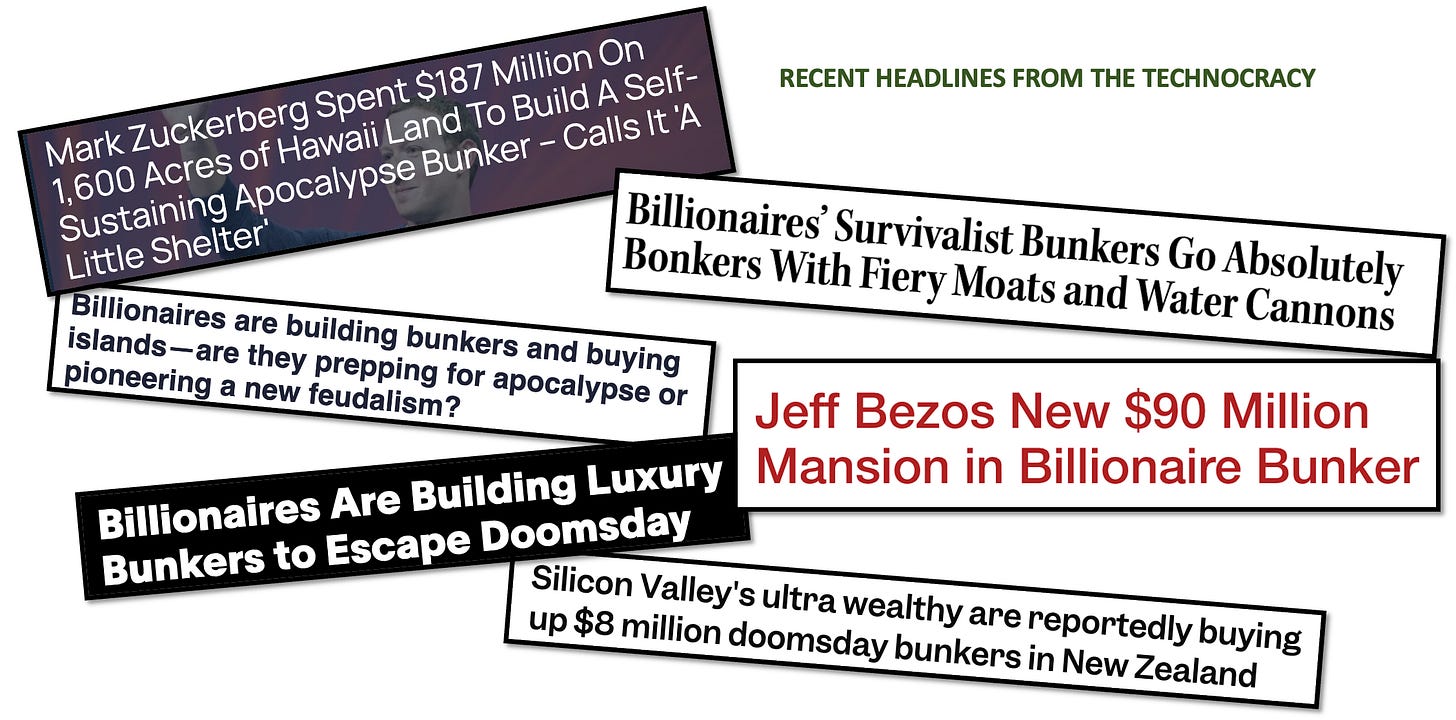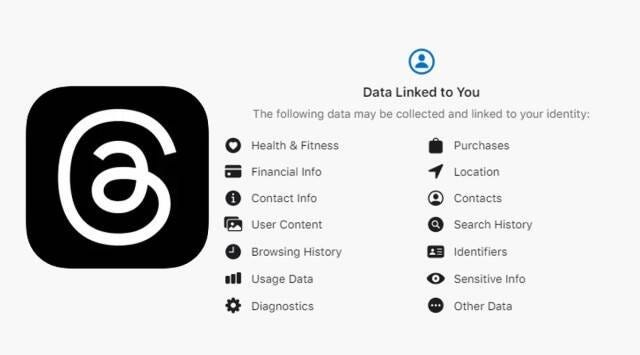Welcome to the Worldwide Wall
Why are web platforms turning into bunkers and internment camps?
Around the year 250, people in the Roman Empire started building walls. And it happened everywhere.
What was going on?
Not long before, cities had spread over open territory. People could enter or leave easily. They felt safe. But now, over the course of just a few years, everything changed.
“By the end of the third century every sizeable city within the empire had acquired a wall,” explains historian Adrian Goldsworthy. “Almost all were very thick,” he adds.
Please support my work by taking out a premium subscription—just $6 per month (even less if you sign up for a year).
This happened even in Rome itself. Emperor Aurelian built a huge wall—more than twelve miles in length and almost twenty feet high. Most of the city was now safely enclosed.

But this didn’t make things safer for citizens, and least of all for the emperor. Aurelian was murdered—as was almost every other emperor during the course of that unstable century.
During the middle decades of the third century, more than 60 people claimed the title of emperor. Some only survived a few weeks before getting killed.
The murderers were usually those guarding the emperor. Good luck fixing that with a wall.
But that didn’t stop the enthusiasm for building fortresses. And the people who built them weren’t foolish. In a world of armed encampments, you need one yourself—or you will get destroyed.
And that reminds me of our own times.

People are in love with walls nowadays. That became clear in the recent US election.
But the clamor for barriers and isolationism isn’t just an American phenomenon. The wall mentality is everywhere. And it’s not just physical walls, even invisible ones keep getting erected—just consider all the visa and entry requirements for international travel.
I can’t even visit England without a visa nowadays. Just a few years ago, that would have seemed absurd. Not it’s just standard practice.
But there’s another place where people are obsessed with walls and fortresses. I’m talking about the worldwide web.
They really should change the name to worldwide walls. Because every digital platform is now run by its own authoritarian emperor, who is hellbent on building bunkers and barriers.
By the way, they are also doing this in their private lives. Even Emperor Aurelian never dreamed of protection as extreme as a web billionaire’s getaway home.
What’s next in tech home design? Centurions in full garb? Gladiator games? Feeding under-performing managers to the lions?
I don’t even want to speculate.
But I can’t ignore this—because these digital dictators are doing the exact same thing to web users. They dream of locking us up permanently in their online encampments.
I recently wrote about the strange phenomenon of the “search engine that doesn’t want you to search.” Google has actually been able to reduce clicking on links by more than a third.
This is crazy.
The entire purpose of a search engine is connecting you with the rest of the web. But Google is so obsessed with keeping people locked up in its fortress, that it undermines its own basic business proposition.
“Not long ago, people surfed the web. Now it’s more like The Shawshank Redemption.”
Instead of connecting you, it wants to serve up pre-digested AI answers—almost as if it were envious of Quora. Sure, the results suck, but that doesn’t matter. The key thing on the web now is holding people in captivity.
A few days later, Apple confirmed that Google searches are now falling on its Safari browser. “That has never happened in 22 years,” said Apple’s Eddy Cue.
Google’s share price fell 7.5% on this news, losing $150 billion in market value over the course of a few hours.
But they don’t care. They don’t want customers, they want prisoners. And so they keep building walls.
The same thing is happening at every social media site.
Not long ago, I posted links to my Substack articles on Twitter and Facebook—and occasionally on Threads and Bluesky. But I rarely bother doing that anymore.
These platforms hate links—or anything that might let captives escape from their digital dungeon. The algorithm brutally punishes any post that might tempt somebody to look elsewhere.
Not long ago, people surfed the web. Now it’s more like The Shawshank Redemption. You’re lucky if they let you out in the prison yard for a few minutes of exercise under armed supervision.
There’s heavy irony in how Elon Musk brags about his support of citizen journalism. The reality is that he works to undermine any journalist who operates outside of his fortress.
If he can’t monetize it, he hates it. Monetization is even more important to him than his political or ideological commitments.
That’s not citizen journalism. It’s just another billionaire’s bunker. Anyone who tries to breach the walls of his prison is censored or shadowbanned or algorithmically isolated.
And that’s why the digital dictators have prioritized the endless scroll—built on short, dumb videos. These stupid video clips have no connection to the original purpose of social media, namely connecting you with friends, family, and other people. But, like Google, the social media platforms don’t care.
They have lost interest in anything except holding people captive.
Just try leaving these digital internment camps—and see for yourself. It’s like Escape from Alcatraz 2.0.
When Mark Zuckerberg launched Threads—his Twitter alternative—he wanted to bring people over from Instagram. But few realized that they couldn’t delete their Threads data without shutting down their Instagram account.
And Threads tracks lots of data. Even the KGB never imposed this much surveillance.
Some people simply refuse to join these platforms. But that doesn’t work—Facebook actually creates shadow accounts of non-members, and still compiles information on them.
You literally can’t escape.
Silicon Valley tracks you everywhere you go. Apps and smartphones are like ankle bracelets for felons, except that your sentence never ends.
In the late third century, even peaceful people needed a fortress. And the same is true now.
That’s why indie operators like me are also constructing our own digital walls. But we need that for survival in this ugly new environment.
People sometimes ask me why I have a paywall for some of my articles. I explain that I have no choice.
I previously wrote for periodicals that shared my articles online for free—and we both got paid via advertising. But Google has put almost every one of them out of business.
Alphabet swallowed up all the ad revenues from A to Z. Ten thousand newspapers disappeared—but in Silicon Valley they don’t worry about collateral damage to the culture.
Just last week, Google made this absolutely clear. In 2024, they prevented legislation requiring them to compensate publishers by promising to fund indie journalism. But they have now changed their mind.
That’s why writers and other creatives need their own paywalls.
I try to be judicious—and still allow free access to around 65% of what I write. But I can’t go back to the old ways, because the people running Twitter, Google, Facebook, and other digital platforms have destroyed that world.
They would also destroy Substack if they could. They just haven’t figured out how to do it (yet). Let’s hope they never do.
So what’s next?
In the late stages of the Roman Empire, people started wearing suits of armor when they journeyed far from the castle. Maybe that will happen in Silicon Valley too.
We already have billionaire bunkers, so perhaps Zuckerberg, Musk, and Bezos will soon enclose themselves in heavy metal, like medieval knights.

When I think of it, their fetish for astronaut suits is already a step in that direction.
This can’t possibly be a smart long-term strategy.
Just look at what happened when the Romans put all their energy into building walls.
You might think that this led to more internal cooperation—after all, people inside the fortress really ought to work together. But the number of civil wars and homemade assassinations skyrocketed during this same period.
It seems that locking people together in a bunker makes them hate each other. Perhaps you’ve noticed something similar in our walled-in countries and web platforms.
The prison metaphor is, once again, an apt one. You’re not safer when you’re locked behind bars. That’s actually the most dangerous place of them all.
Here’s something else that happened when the Romans built their walls: Trade collapsed. This has been documented by the archeological evidence.
In a world of barricades and obstacles, you can’t count on supplies from the external world. So you have to be totally self-sufficient.
Have you noticed that happening today? Have you heard the word tariff in the news, by any chance?
The economic penalty of imposed self-sufficiency is enormous. Things that could be easily acquired through partnership, trade, or cooperation must now be built from scratch inside each bunker.
This leads to a tremendous drain on resources and unnecessary duplication.
The tech billionaires are living examples of this. Each tech dictatorship wants to control its own chatbot, launch its own video channel, fly to outer space on its own rocket.
And what’s our role as tech users? As the name suggests, we exist to be used.
Some of us, however, are starting to rebel.
I rarely post on social media anymore. I don’t rely on Google as often as before. I buy fewer items from Amazon now, and have started to shop directly with indie online retailers.
I’m not the only one. Many of you are doing the same.
The people running these digital encampments are already losing users and killing loyalty. Sooner or later, they will realize that prison warden is not a cool job.
Maybe they should do some research on all that wall-building during the third century. Back then, the shift of resources into creating bunkers and fortresses was a sign of decline. Even the wall-builders got punished.
I suspect that the same will happen to those who persist in building worldwide walls today, whether in the world at large or on the digital highways.
Honestly, I’d rather be surfing the web, and not plotting an escape from Shawshank. Maybe that will happen again. In the meantime, get ready to bunker down.





I’m only 20 years old but I am very afraid for younger generations who have been/are/will be sentenced to these prisons at age three via unfettered access to a smart device. Just like Red warned in Shawshank Redemption: you’re in there long enough and you become institutionalized. How can people unplug if it’s all they have ever known? Nowadays it seems like a real privilege to NOT grow up interacting with highly advanced technology from a young age.
Many thanks for this article. Although your metaphor is painfully apt, I am more perplexed by another point you raise. Why has Google become so worthless? Even the "advanced search" feature frequently goes hopelessly off-topic. YouTube is a complete joke. I have asked for recordings of Mozart or Beethoven on period instruments and been shown videos/clips from Westerns, karate/kung fu movies, performances of other composers, and (of course) recordings of different works by the given composer(s) on contemporary instruments.
These are all recent developments. Ten years ago, Google's "advanced search" was remarkably good, and YouTube could lead me directly where I wanted to go. Thus, the (other) big question: why?